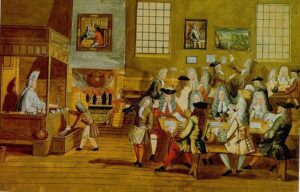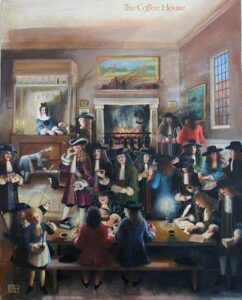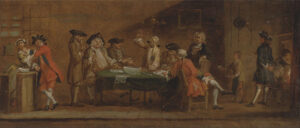The History of London’s Coffee Houses
Date post added: 16th October 2024
Believe it or not, until the 1990s, London’s streets weren’t brimming with coffee shops offering single-origin, locally roasted, organic drinks 24/7. You couldn’t get an oat latte or soy flat white to savour for several hours while attempting to work in a noisy cafe. Scary thought eh?
But in the seventeenth century that all changed. Early coffee houses were busy, noisy meeting places serving pretty grim coffee (arguably, not that dissimilar to a modern day Starbucks). Businessmen and intellectuals gathered there to share ideas, tell stories and offer opinions.
Let’s look at the progression from London’s first coffee houses to modern day barista brew bars. Pour yourself an espresso, and discover the important role London’s coffee houses played in social and political history.
When did coffee houses first become popular in London?
Europe was introduced to coffee before Britain, with the first European coffeehouse opening in Venice in 1645. From Italy, coffee took a short hop to Turkey. And it was a Turkish Jew by the name of Jacob who set up the first coffee house in England – The Angel in Oxford – in 1650.
The first London coffee house came two years later, in 1652, in St. Michael’s Alley off Cornhill. Set up by a Greek servant named Pasqua Rosée, the coffee stall was known as Pasqua Rosée’s Head. Rosée was servant to Daniel Edwards who imported goods from Turkey, including the coffee sold on the stall. Hence it also being known as The Turk’s Head.
Pasqua Rosée did a good PR job, distributing a pamphlet on the “virtue of the coffee drink” and congratulating himself on being the first to make and sell the beverage in England. Its popularity led to other coffee stalls being set up, and later, the first coffee houses. By 1663, there were 83 coffee houses across London.
What were 17th century coffee houses like?
Early coffee houses presented a welcome alternative to the already-established pub/ inn. No alcohol could be served in a coffee house, and no women were allowed in. They were proudly positioned as reputable venues – an antidote to drunkenness and violence. Coffee houses were a place for men to gather and share news and stories, have intellectual debates and do business deals.
17th century writer and diarist, Samuel Pepys wrote in December 1660, “[Coll. Slingsby] and I in the evening to the Coffee-house in Cornhill, the first time that ever I was there. And I find much pleasure in it through the diversity of company – and discourse.”
These reputable venues became known as ‘penny universities.’ For the price of a coffee, you could learn from great minds and join intellectual discussions and debate. They provided an accessible alternative to traditional academic institutions. Some of the great minds known to frequent coffee houses include the poets John Dryden and Samuel Alexander Pope, physicist Isaac Newton and, of course, Samuel Pepys. John Dryden was known to be a loyal customer at Will’s Coffee House on the corner of Russell Street.
Coffee, business deals and a meeting of minds
Entrepreneurs, businessmen and politicians often met in coffee houses. They were pretty tribal in their loyalties too, with specific political parties or trades sticking to particular venues.
Man’s Coffee House at Charing Cross was for stockjobbers. White’s at St James’s for politicians. Writers gathered at Button’s in Bow Street. Lawyers went to the Grecian at the Temple and Nando’s at the Rainbow Tavern at Inner Temple Lane. Old Slaughter’s in St Martin’s Lane attracted artists. Clergymen would go to Child’s in St Paul’s Churchyard. The Little Devil in Goodman’s Fields was the place for the military. The Hudson Bay Company would hire seaman from The Amsterdam Coffee House behind the Royal Exchange.
Scientists were represented too with members of the Royal Society meeting in coffeehouses to discuss, debate, and exchange knowledge. It’s said that Isaac Newton once dissected a dolphin on the table of the Grecian Coffeehouse.
Exchange Alley (now Change Alley), off Cornhill in the City, was home to three important coffee houses of the time. They became business centres in their own right, for trades centred on the Royal Exchange.
Garraway’s was the home to sales and auctions (ships in particular). At Jonathan’s Coffee House, there was an early stock exchange going on. And Edward Lloyd’s place, Lloyd’s Coffee House was where insurance began, with the sale and underwriting of ships happening there. These were the origins of the British financial institution, Lloyd’s of London.
The Great Fire of London destroyed Garraway’s and Pasqua Rosée’s original coffee house, but both were rebuilt at the end of the 1660s. Pasqua Rosée’s was renamed The Jamaica Coffee House after the West Indies tradespeople who met there (it’s now The Jamaica Wine House).
The impact of coffee houses
18th century coffee houses were places for knowledge-sharing. Men gathered around a long table at to talk business, and discuss news, politics and ideas. Coupled with the rapid spread of coffee houses around London, came the rapid spread of ideas. This was a changing time.
The coffee houses were also the birthplace of periodical literature and essays. In 1709, Tatler was founded with The Spectator following in 1711. Both published stories from the coffee houses, the most important places to learn the latest news.
It was this communication concept that rattled members of the establishment. King Charles II was rather threatened by the political minds meeting in London coffee houses and sharing their opposing views. In 1675 he issued a proclamation ordering their closure. This threat ruffled many feathers, caused much resentment and had to be abandoned. There was such a large stock of tea and coffee in London by that time, that a ban would have caused major commercial problems.
A different blend of coffee house
By the early 18th Century, there was around 500-600 coffee houses across the Cities of London and Westminster. Whilst the venues listed above specialised in respectable trades like finance, law and science, others were a little less dignified. For the price of a penny, you could vote on a person’s sanity and sentence them to the asylum – and get a refill of coffee. You could also find a lady for the night (or next hour) and all sorts of criminals.
Psst, if you love to learn about vices in the city, join our Seven Deadly Sins walking tour
As a drink, coffee was facing fierce competition from the tipple most associated with the English – tea. Thanks to the East India Company’s direct trade routes, tea was rising in popularity and affordability. This shift in drinking preferences in Britain during the late 18th and early 19th centuries impacted coffee houses too. They evolved, becoming more exclusive and elite, sometimes the preserve of private members.
It wasn’t until the late 20th century that coffee was back on trend in Britain. Now, you can’t walk down a street without finding a coffee shop. As fast as pubs are closing, coffee shops are opening up across London and the entire country. Accessible and popular, coffee shops are once again spaces for Brits to socialise, and share news and ideas.
Drink in delicious stories from the coffee houses
Join us on our sinful walk through Covent Garden and beyond. Our expert guides will open your eyes to incredible tales from the area, pointing out sites of original coffee houses on the way. You’ll laugh, gasp and be thoroughly entertained for two hours solid.





